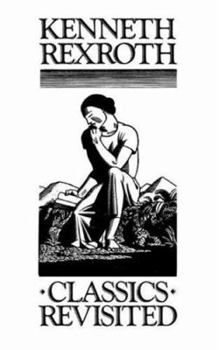Classics Revisited
Select Format
Select Condition 
Book Overview
Poet, translator, essayist, and voracious reader--Kenneth Rexroth was an omnivore in the fields of literature. The brief, radiant essays of Classics Revisited discuss sixty key books that are, for Rexroth, "basic documents in the history of the imagination." Ranging from The Epic of Gilgamesh to Huckleberry Finn, these pieces (each about five pages long) originally appeared in the Saturday Review. Distinguished by Rexroth's plain, wide-awake style, Classics Revisited presents complex ideas in simple language, energized by the author's air of talking eye-to-eye with his reader. Elastic, at home in several languages, Rexroth is not bound by East or West; he leaps nimbly from Homer to The Mahabharata, from Lady Murasaki to Stendhal. It is only when we pause for breath that we notice his special affinities: for Casanova, lzaak Walton, Macbeth, Icelandic sagas, classical Japanese poetry. He has read everything. In Sterne, he sees traces of the Buddha; in Fielding, hints of Confucius. "Life may not be optimistic," Rexroth maintains in his introduction, "but it certainly is comic, and the greatest literature presents man wearing the two conventional masks; the grinning and the weeping faces that decorate theatre prosceniums. What is the face behind the mask? Just a human face--yours or mine. That is the irony of it all--the irony that distinguishes great literature--it is all so ordinary."
Format:Paperback
Language:English
ISBN:0811209881
ISBN13:9780811209885
Release Date:May 1986
Publisher:New Directions Publishing Corporation
Length:228 Pages
Weight:0.54 lbs.
Dimensions:0.9" x 4.9" x 7.9"
Customer Reviews
2 ratings
rexroth
Published by Thriftbooks.com User , 24 years ago
this book has made me stop wasting my time with secondary new things and try to focus onthe top books. i thank rexroth for getting me to read f m ford's "some do not..." , a really great novel. his remarks on homer are great,and his comments make wonderful reading.
The best introduction to the Classics (western and non-)
Published by Thriftbooks.com User , 25 years ago
Rexroth was "the father of the beatniks" and steeped in a humane understanding of the classics. Rexroth's book discusses sixty volumes, such as the Illiad & Odyssey, Beowolf, Njal's Saga, Job, Mahabarata, Kalevala, Sappho, Aeschylus, Sophocles, Euripides, Herodotus, Plato, Livy, and so on, through Mark Twain and Chekhov. A second volume contains similar sweep across different authors/works. As Rexroth says, these classic texts from around the world are "basic document in the history of the imagination".A review of Rexroth's book in the Villlage Voice, written three decades ago, says that "The talk is expansive, linking the archaic and the immediate, finding in Euripides 'the first psychedlic system of values, a middle-class substitute for mystical vision,' or noting how in Caesar's _Gallic War_ 'the simple nouns and verbs carom off each other like billiard balls... The rapid and complex movement of simple elements deploys on the page exactly like the battle it describes.'...The books he loved he saw as emanations of living feeling, line of communication miraculously kept open."Or, to quote from Rexroth himself: "Life may not be optimistic, but it certainly is comic, and the greatest literature present man wearing the two conventional masks; the grinning and the weeping faces that decorate theatre prosceniums. What is the face behind the mask? Just a human face -- yours or mine. That is the irony of it all -- the irony that distinguishes great literature -- it is all so ordinary."Without denigrating the non-Western tradition -- in fact, by including many essays about non-Western classics -- and without paying homage via knee jerks, Rexroth succeeds brilliantly.





